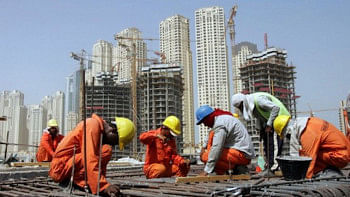Human trafficking needs multi-dimensional response

It is disheartening that human trafficking still poses a serious threat to Bangladesh despite the progress made in combating it in recent times. Currently, there are a number of special tribunals to deal with trafficking-related cases, and as per the US State Department's 2023 Trafficking in Persons (TIP) Report, 94 traffickers were convicted in 35 cases in the latest reporting period, whereas 18 were convicted in 11 cases in the previous period. Legal instruments are proving vital in the fight against trafficking, so the rise in convictions should convince us of the effectiveness of ongoing measures. However, as experts have pointed out at a recent event, significant challenges remain.
While legal consequences do serve as deterrence, trafficking will continue to occur unless we address its root causes such as poverty, inequality, and lack of education. These factors often make individuals vulnerable to exploitation and entrapment by traffickers, who also take advantage of poor social and administrative safeguards that are in place. For a multi-dimensional problem like this, the response needs to be multi-dimensional, too. Experts at the event highlighted a number of areas where the authorities must intervene simultaneously and redouble existing efforts.
The first challenge is to "cut off the source", which the government can do by implementing comprehensive socio-economic policies aimed at uplifting marginalised communities – where the victims usually come from – and providing them with better opportunities for education and sustainable livelihoods. This is a big task, of course, but eradicating poverty can help address a lot of other critical challenges as well. Continuously raising awareness is also crucial, as many potential victims and their families may not be aware of the dangers of trafficking or may lack knowledge of available support services.
The next front is institutional. Ensuring proper institutional safeguards requires a thorough review of related manpower and law enforcement agencies and plugging any hole that exists. A vital part of this is strengthening the justice system, including enhancing the capacity of investigators and prosecutors. While the numbers provided by the TIP report are encouraging, the rate of convictions in general is still frustratingly low. An analysis of the convictions shows that the courts sentenced most traffickers to just fines. The imposition of fines rather than jail time weakens deterrence and likely creates security and safety concerns, particularly for victims cooperating with officials. We must, then, build a strong legal framework with well-trained investigators and prosecutors who can ensure that traffickers face appropriate consequences for their actions. We also need to ensure every victim gets the support and protection they deserve.
Finally, collaboration among all the sectors and stakeholders is vital to a successful anti-trafficking strategy. Everyone must play their part so we can make it impossible for the traffickers to commit the crime, or get away without punishment.


 For all latest news, follow The Daily Star's Google News channel.
For all latest news, follow The Daily Star's Google News channel. 









Comments